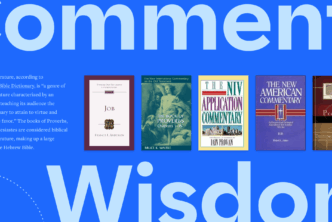The Evangelical Biblical Theology Commentary is a special new kind of commentary. It includes not just exegetical comments about the meaning of specific verses; it also has a biblical theology section where it traces out the theological themes of a given book. In Jim Hamilton’s brand new commentary on Psalms in the EBTC, for example, he discusses the theme of “Culture” in the Psalms—and gives some answers to a key question many readers have about the book: what should we do with the violent imprecations? Below is just a portion of his discussion.
When a group of people agree on the world’s master story, on the truths it teaches, the behaviors that accord with it, and when their worship grows out of it—and everyone worships—that group has a shared culture. Alec Basson’s conclusion is correct: “The textual information in the biblical Hebrew psalms … is more than literary information as such; it is also a cognitive and cultural representation of the psalmist’s world.”1
The psalmists understood themselves to be sharing in and extending the culture that stems from the Torah of Moses, continues through the Former and Latter Prophets, and receives further elaboration and attention in the Writings. People who embrace this culture do not lament the fact that God has promised that his king will reign over all the ends of the earth. Rather, they long for God’s king to do just that, as Psalm 2 promises he will. The people opposed to God’s empire are the ones warned to learn wisdom by that same psalm.
Empire, conquest, revenge, and violence
Operating within a different culture, on the basis of a different worldview, whose foundations and rationale are not explained but assumed, Ellen Charry writes,
Despite the beauty of the language there are reasons to be shy of the psalms. Many countenance attitudes and policies of empire, conquest, revenge, and violence [that] are deeply disturbing to modern sensibilities when read as Scripture, even when one recalls that most of the poems are not proposed as from God but to or about God. These are not values that one necessarily wants to inculcate in one’s children.2
Charry’s standard of good, whereby she judges the Psalms to be “deeply disturbing,” comes from some other culture than the one inculcated by the Scriptures. She does not wish her children to embrace these values? Does she not want God to reign over his cosmic empire through the vice-regency of the king from David’s line? What is it that she prefers to this political arrangement—the kingship of the messiah—and why? Does she not believe that God’s king should conquer, that he should apply God’s righteous standards by liberating the oppressed and visiting judgment upon the wicked?
She has some standard of righteousness, evidently, whereby she condemns that of the psalmists, and this leads her to assert: “These are not values that one necessarily wants to inculcate in one’s children.”
As for me and my house
But all who embrace the interpretive perspective of the biblical authors are prepared to make an “as for me and my house” declaration (Josh 24:15). Yes these are the values we want our children to embrace, because we want them to fear and know God. The Bible’s Spirit-inspired values are to be preferred, however “disturbing” they may be “to modern sensibilities.” Modern sensibility needs to be reshaped by biblical wisdom; moderns need to gain sense (Prov 8:1–21, esp. 8:5), and serve Yahweh with fear (Ps 2:10–12). Graeme Goldsworthy is correct:
We have to recognize that salvation is an act of God’s judgment. This explains something of what lies behind the prayers for judgment on Israel’s enemies. Sometimes these seem to be vindictive, and have evoked a sense of moral outrage in some people. Of course it is possible for even God’s people to allow the baser feelings of revenge to rise within them, but that does not change the fact that no redemption in the Bible occurs without judgment.3
The Bible’s values are rooted in the soil of God’s revelation of himself from Genesis to Revelation, a revelation of his very character. Charry has cast in her lot with those who deem their own thoughts and values superior to the Bible’s, and those who do not turn from such opinions will find themselves described by Psalm 1, chaff that the wind drives away, and Psalm 2, destroyed in the way. …
Jesus’ view of the Psalms
As a Christian, I am convinced that Jesus accurately discerned what the Old Testament authors intended to communicate. Further, I am convinced that Christ’s own Spirit inspired those Old Testament authors to write such that they prophesied and typified precisely who Jesus would be and what he would do (not losing sight of Eph 3:4–5 and 1 Pet 1:10–12).
Jesus taught his disciples how to understand the Scriptures, and those disciples, in their New Testament writings, continue to instruct followers of Jesus. Moses prepared the ground for this interpretive field, and the prophets and sages and psalmists learned to interpret the Bible and life from him. Jesus then learned to interpret the Bible from Moses and the prophets, and that interpretive culture is the one I seek to understand. If we make progress in this endeavor, I contend that we will not describe the interpretation of the Psalms found in the New Testament as “exegetical license.” Rather, as Thomas Schreiner puts it,
The interpretation offered by the New Testament fits what the Old Testament itself teaches, so that the New Testament writers are not guilty of imposing an alien interpretation upon the Old Testament storyline.” …4
This way of approaching the Psalms would also seem to line up with Millar’s comments:
The psalms are (largely) first the prayers of David the messiah. Presumably, they were then picked up and prayed (or sung) by Israel as “the people of the Messiah.” These “prayers of the suffering Messiah,” then, find their fullest meaning when read in a biblical-theological context as “prayers of the Messiah” Jesus Christ. So can we pray the prayers as Christians? Yes we can—in the same sense that we are enabled by Jesus to share in his prayers to his Father, his death and resurrection enable those who follow in his steps to pray these “messianic” prayers in a derivative sense.5
***
This article was originally published in the May/June 2022 issue of Bible Study Magazine. Slight adjustments, such as title and subheadings, may be the addition of an editor.
Related articles
- Psalm 2: Its Meaning in the New Testament
- Pray the Psalms with Your Church
- How the Psalms of Lament Teach Us to Turn Our Complaints to God
Related resources
- Divine Metaphors in Selected Hebrew Psalms of Lamentation, FAT 2/15 (Tübingen: Mohr Siebeck, 2006), 243.
- Ellen T. Charry, Psalms 1–50: Sighs and Songs of Israel, BTCB (Grand Rapids: Brazos, 2015), xix.
- Graeme Goldsworthy, Prayer and the Knowledge of God: What the Whole Bible Teaches (Leicester: Inter-Varsity Press, 2003), 139.
- Thomas R. Schreiner, “The Commands of God,” in Hafemann and House, Central Themes in Biblical Theology, 72.
- J.G. Millar, Calling on the Name of the Lord: A Biblical Theology of Prayer (Downers Grove: InterVarsity Press, 2016), 142–43.







